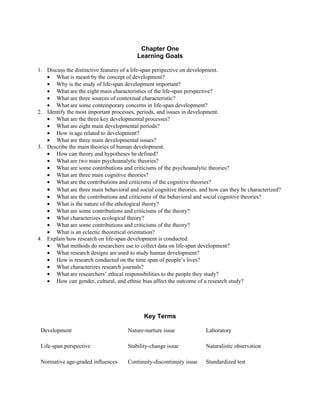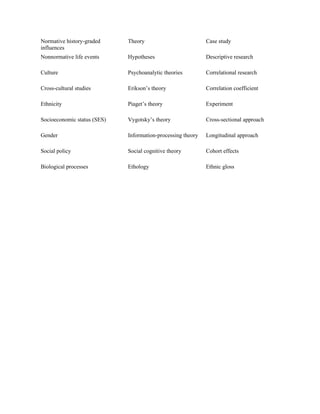Dev Psych.ch1.studyguide
- 1. Chapter One Learning Goals 1. Discuss the distinctive features of a life-span perspective on development. • What is meant by the concept of development? • Why is the study of life-span development important? • What are the eight main characteristics of the life-span perspective? • What are three sources of contextual characteristic? • What are some contemporary concerns in life-span development? 2. Identify the most important processes, periods, and issues in development. • What are the three key developmental processes? • What are eight main developmental periods? • How is age related to development? • What are three main developmental issues? 3. Describe the main theories of human development. • How can theory and hypotheses be defined? • What are two main psychoanalytic theories? • What are some contributions and criticisms of the psychoanalytic theories? • What are three main cognitive theories? • What are the contributions and criticisms of the cognitive theories? • What are three main behavioral and social cognitive theories, and how can they be characterized? • What are the contributions and criticisms of the behavioral and social cognitive theories? • What is the nature of the ethological theory? • What are some contributions and criticisms of the theory? • What characterizes ecological theory? • What are some contributions and criticisms of the theory? • What is an eclectic theoretical orientation? 4. Explain how research on life-span development is conducted. • What methods do researchers use to collect data on life-span development? • What research designs are used to study human development? • How is research conducted on the time span of people’s lives? • What characterizes research journals? • What are researchers’ ethical responsibilities to the people they study? • How can gender, cultural, and ethnic bias affect the outcome of a research study? Key Terms Development Nature-nurture issue Laboratory Life-span perspective Stability-change issue Naturalistic observation Normative age-graded influences Continuity-discontinuity issue Standardized test
- 2. Normative history-graded Theory Case study influences Nonnormative life events Hypotheses Descriptive research Culture Psychoanalytic theories Correlational research Cross-cultural studies Erikson’s theory Correlation coefficient Ethnicity Piaget’s theory Experiment Socioeconomic status (SES) Vygotsky’s theory Cross-sectional approach Gender Information-processing theory Longitudinal approach Social policy Social cognitive theory Cohort effects Biological processes Ethology Ethnic gloss

